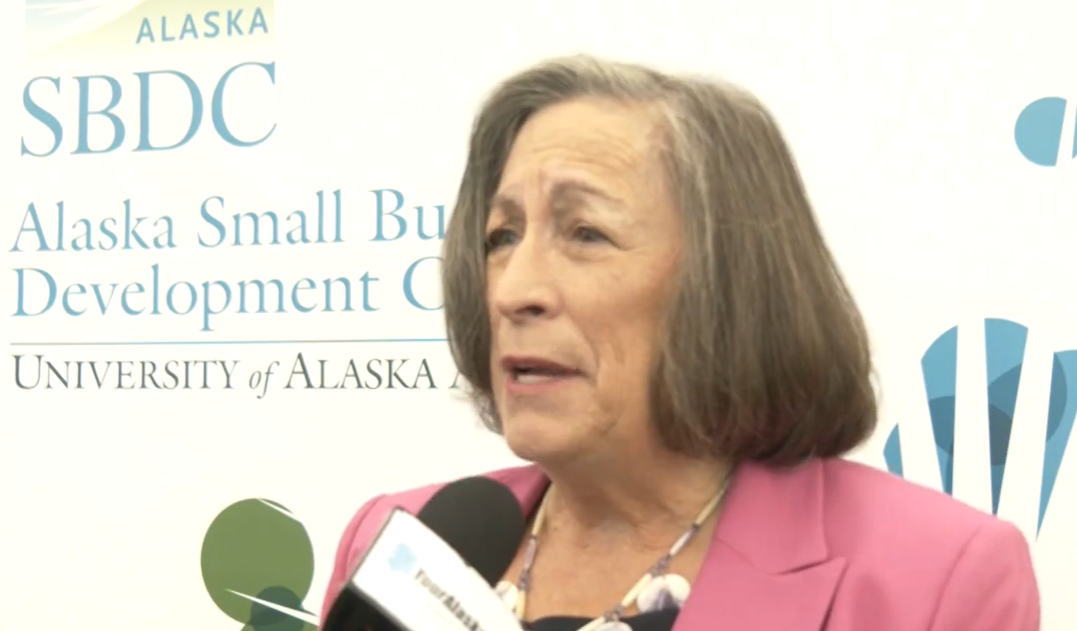
- Details
- By Native News Online Staff
Earlier this week, U.S. Treasurer Chief Lynn Malerba visited Alaska to meet with Alaska Native tribal leaders in her first official visit to an Alaska Native Tribe.
Chief Malerba’s visit celebrated the recent announcement of up to $83 million in State Small Business Credit Initiative (SSBCI) funds for a consortium of 125 Alaska Tribes. Funded by the Biden-Harris Administration’s American Rescue Plan (ARP), this investment supports the nation’s largest Tribal SSBCI consortium and is part of the most expansive investment in small business financing for Tribal governments in history. Through the consortium, 125 Tribes will access critical economic development resources for Alaska’s Tribal economy and the funds are anticipated to catalyze as much as $830 million in additional private sector investment across the state and in Native-owned businesses.
During the visit, Treasurer Chief Malerba attended a roundtable discussion in Anchorage, Alaska which was hosted by the Alaska Federation of Natives to discuss economic challenges impacting Alaska Native communities. The Treasurer also traveled to meet with Chickaloon Village, a rural Alaska Native Tribe. This visit included a tour of Tribal facilities funded with ARP programs. The Treasurer was joined by Consumer Financial Protection Bureau Director Rohit Chopra.
The Treasurer concluded her visit with a roundtable with lenders and investors at the University of Alaska Anchorage which is administering the funding on behalf of the Tribal consortium.
With this recent SSBCI announcement, Treasury has now approved SSBCI applications for up to $415 million to support more than 220 Tribes through the SSBCI Capital Program for small businesses and tribal enterprises.
More Stories Like This
Native News Weekly (August 25, 2024): D.C. BriefsUS Presidents in Their Own Words Concerning American Indians
Indigenous Actor Elaine Miles Reports Detention by Alleged ICE Agents
Happy Thanksgiving from Native News Online
Coming Up on Native Bidaské: Behind the Animation: Joey Clift Talks “Pow” and Native Storytelling
Help us tell the stories that could save Native languages and food traditions
At a critical moment for Indian Country, Native News Online is embarking on our most ambitious reporting project yet: "Cultivating Culture," a three-year investigation into two forces shaping Native community survival—food sovereignty and language revitalization.
The devastating impact of COVID-19 accelerated the loss of Native elders and with them, irreplaceable cultural knowledge. Yet across tribal communities, innovative leaders are fighting back, reclaiming traditional food systems and breathing new life into Native languages. These aren't just cultural preservation efforts—they're powerful pathways to community health, healing, and resilience.
Our dedicated reporting team will spend three years documenting these stories through on-the-ground reporting in 18 tribal communities, producing over 200 in-depth stories, 18 podcast episodes, and multimedia content that amplifies Indigenous voices. We'll show policymakers, funders, and allies how cultural restoration directly impacts physical and mental wellness while celebrating successful models of sovereignty and self-determination.
This isn't corporate media parachuting into Indian Country for a quick story. This is sustained, relationship-based journalism by Native reporters who understand these communities. It's "Warrior Journalism"—fearless reporting that serves the 5.5 million readers who depend on us for news that mainstream media often ignores.
We need your help right now. While we've secured partial funding, we're still $450,000 short of our three-year budget. Our immediate goal is $25,000 this month to keep this critical work moving forward—funding reporter salaries, travel to remote communities, photography, and the deep reporting these stories deserve.
Every dollar directly supports Indigenous journalists telling Indigenous stories. Whether it's $5 or $50, your contribution ensures these vital narratives of resilience, innovation, and hope don't disappear into silence.
 The stakes couldn't be higher. Native languages are being lost at an alarming rate. Food insecurity plagues many tribal communities. But solutions are emerging, and these stories need to be told.
The stakes couldn't be higher. Native languages are being lost at an alarming rate. Food insecurity plagues many tribal communities. But solutions are emerging, and these stories need to be told.
Support independent Native journalism. Fund the stories that matter.
Levi Rickert (Potawatomi), Editor & Publisher

